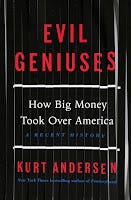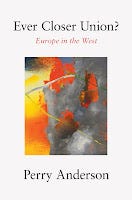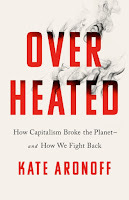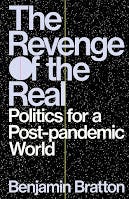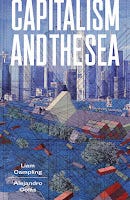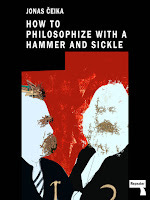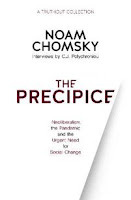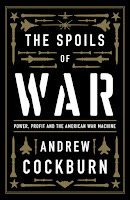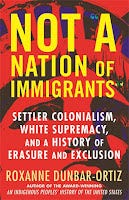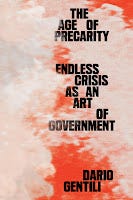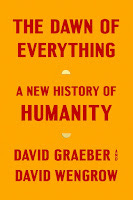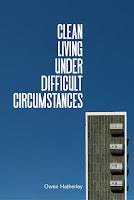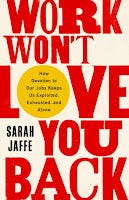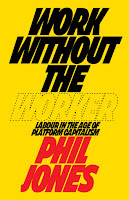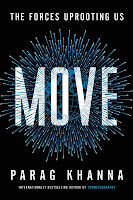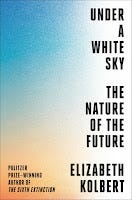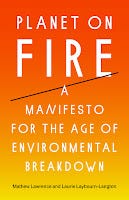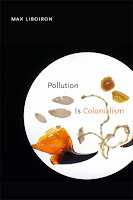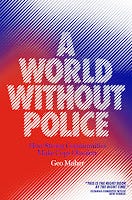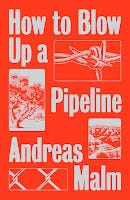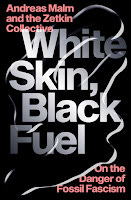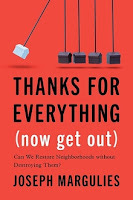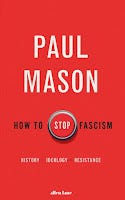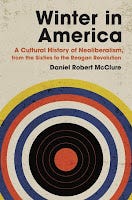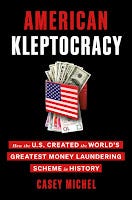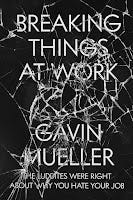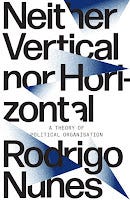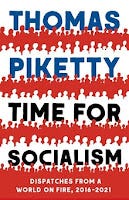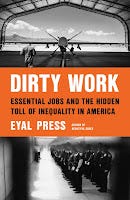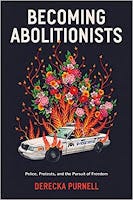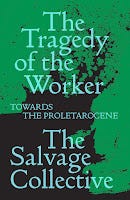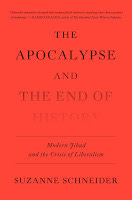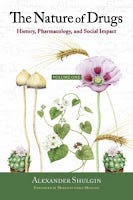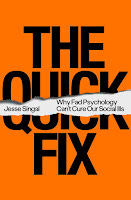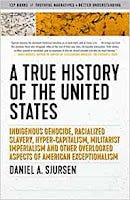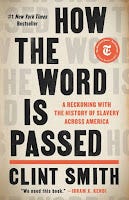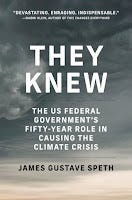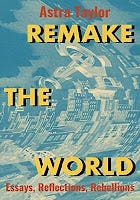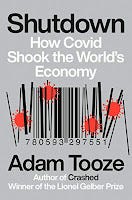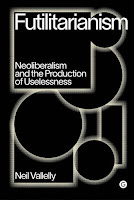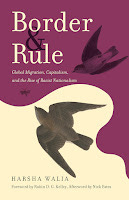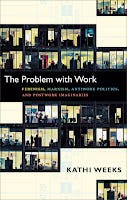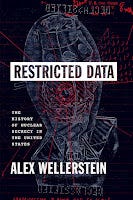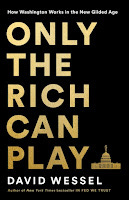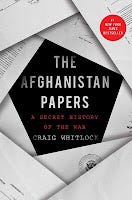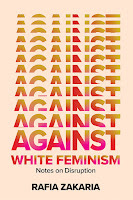Just Mason's Favorite Books of 2021
A Predominantly Political Plethora of Vigorously Veritable Volumes
2021 saw the release of a number of books that seek to explain the multitudinous crises faced by humanity. The following are my picks for the most insightful, incisive and influential efforts from some of the best journalists and academics in the world. They range from novel historical perspectives on the imperial roots of racism and scathing critiques of the profit-over-people politics of neoliberalism, to urgent calls to dismantle fossil capital in order to avert climate catastrophe and visions of a post-racial, post-capitalist, post-work, utopian future. I did not have the time to write my own reviews for each of them, so I've included the publishers' synopses. Please let me know your favorites of 2021 in the comments below, and happy reading. Cheers!
Knowledge is power…power to the people!
Ray Acheson – Banning the Bomb, Smashing the Patriarchy | Rowman & Littlefield
"Banning the Bomb, Smashing the Patriarchy offers a look inside the antinuclear movement and its recent successful campaign to ban the bomb. From scrappy organizing to winning the Nobel Peace Prize in 2017 and achieving a landmark UN treaty banning nuclear weapons, this book narrates the journey of the International Campaign to Abolish Nuclear Weapons (ICAN) and developments in feminist disarmament activism. Acheson explains the process through which diplomats, activists, and nuclear survivors worked together to elevate the horrific humanitarian and environmental impacts of nuclear weapons, develop new international law categorically prohibiting the bomb, challenge the nuclear orthodoxy, and strengthen norms for disarmament and peace. Told from the perspective of a queer feminist antimilitarist organizer who was involved from the start of the process through to the treaty’s adoption, the book utilizes interviews with dozens of participants, as well as critical theoretical perspectives about transnational advocacy networks, discourse change, and intersectional feminist action. It is meant to provide useful insights for anyone trying to make change amidst structures of power and politics."
Spencer Ackerman – Reign of Terror: How the 9/11 Era Destabilized American and Produced Trump | Penguin Random House
"For an entire generation, at home and abroad, the United States has waged an endless conflict known as the War on Terror. In addition to multiple ground wars, it has pioneered drone strikes and industrial-scale digital surveillance, as well as detaining people indefinitely and torturing them. These conflicts have yielded neither peace nor victory, but they have transformed America. What began as the persecution of Muslims and immigrants has become a normalized, paranoid feature of American politics and security, expanding the possibilities for applying similar or worse measures against other targets at home. A politically divided country turned the War on Terror into a cultural and then tribal struggle, first on the ideological fringes and ultimately expanding to conquer the Republican Party, often with the timid acquiescence of the Democratic Party. Today’s nativist resurgence walked through a door opened by the 9/11 era.
Reign of Terror will show how these policies created a foundation for American authoritarianism and, though it is not a book about Donald Trump, it will provide a critical explanation of his rise to power and the sources of his political strength. It will show that Barack Obama squandered an opportunity to dismantle the War on Terror after killing Osama bin Laden. That mistake turns out to have been portentous. By the end of his tenure, the war metastasized into a broader and bitter culture struggle in search of a demagogue like Trump to lead it.
A union of journalism and intellectual history, Reign of Terror will be a pathbreaking and definitive book with the power to transform how America understands its national security policies and their catastrophic impact on its civic life."
Kurt Andersen – Evil Geniuses: The Unmaking of America–A Recent History | Penguin Random House
"During the twentieth century, America managed to make its economic and social systems both more and more fair and more and more prosperous. A huge, secure, and contented middle class emerged. All boats rose together. But then the New Deal gave way to the Raw Deal. Beginning in the early 1970s, by means of a long war conceived of and executed by a confederacy of big business CEOs, the superrich, and right-wing zealots, the rules and norms that made the American middle class possible were undermined and dismantled. The clock was turned back on a century of economic progress, making greed good, workers powerless, and the market all-powerful while weaponizing nostalgia, lifting up an oligarchy that served only its own interests, and leaving the huge majority of Americans with dwindling economic prospects and hope.
Why and how did America take such a wrong turn? In this deeply researched and brilliantly woven cultural, economic, and political chronicle, Kurt Andersen offers a fresh, provocative, and eye-opening history of America’s undoing, naming names, showing receipts, and unsparingly assigning blame—to the radical right in economics and the law, the high priests of high finance, a complacent and complicit Establishment, and liberal “useful idiots,” among whom he includes himself.
Only a writer with Andersen’s crackling energy, deep insight, and ability to connect disparate dots and see complex systems with clarity could make such a book both intellectually formidable and vastly entertaining. And only a writer of Andersen’s vision could reckon with our current high-stakes inflection point, and show the way out of this man-made disaster."
Perry Anderson – Ever Closer Union? Europe in the West | Verso Books
"The European Union is a political order of peculiar stamp and continental scope, its polity of 446 million the third largest on the planet, though with famously little purchase on the conduct of its representatives. Sixty years after the founding treaty, what sort of structure has crystallised, and does the promise of ever closer union still obtain?
Against the self-image of the bloc, Perry Anderson poses the historical record of its assembly. He traces the wider arc of European history, from First World War to Eurozone crisis, the hegemony of Versailles to that of Maastricht, and casts the work of the EU’s leading contemporary analysts—both independent critics and court philosophers—in older traditions of political thought. Are there likenesses to the age of Metternich, lessons in statecraft from that of Machiavelli?
An excursus on the UK’s jarring departure from the Union considers the responses it has met with inside the country’s intelligentsia, from the contrite to the incandescent. How do Brussels and Westminster compare as constitutional forms? Differently put, which could be said to be worse?"
Kate Aronoff – Overheated: How Capitalism Broke the Planet, and How We Fight Back | Bold Type Books
"It has become impossible to deny that the planet is warming, and that governments must act. But a new denialism is taking root in the halls of power, shaped by decades of neoliberal policies and centuries of anti-democratic thinking. Since the 1980s, Democrats and Republicans have each granted enormous concessions to industries hell bent on maintaining business as usual. What’s worse, policymakers have given oil and gas executives a seat at the table designing policies that should euthanize their business model.
This approach, journalist Kate Aronoff makes clear, will only drive the planet further into emergency. Drawing on years of reporting, Aronoff lays out an alternative vision, detailing how democratic majorities can curb polluters’ power; create millions of well-paid, union jobs; enact climate reparations; and transform the economy into a more leisurely and sustainable one. Our future will require a radical reimagining of politics—with the world at stake."
Benjamin Bratton – The Revenge of the Real: Politics for a Post-Pandemic World | Verso Books
"COVID-19 exposed the pre-existing conditions of the current global crisis. Many Western states failed to protect their populations, while others were able to suppress the virus only with sweeping social restrictions. In contrast, many Asian countries were able to make much more precise interventions. Everywhere, lockdown transformed everyday life, introducing an epidemiological view of society based on sensing, modeling, and filtering. What lessons are to be learned?
The Revenge of the Real envisions a new positive biopolitics that recognizes that governance is literally a matter of life and death. We are grappling with multiple interconnected dilemmas—climate change, pandemics, the tensions between the individual and society—all of which have to be addressed on a planetary scale. Even when separated, we are still enmeshed. Can the world govern itself differently? What models and philosophies are needed? Bratton argues that instead of thinking of biotechnologies as something imposed on society, we must see them as essential to a politics of infrastructure, knowledge, and direct intervention. In this way, we can build a society based on a new rationality of inclusion, care, and prevention."
Liam Campling & Alejandro Colás – Capitalism and the Sea The Maritime Factor in the Making of the Modern World | Verso Books
"The global ocean has through the centuries served as a trade route, strategic space, fish bank and supply chain for the modern capitalist economy. While sea beds are drilled for their fossil fuels and minerals, and coastlines developed for real estate and leisure, the oceans continue to absorb the toxic discharges of our carbon civilisation—warming, expanding, and acidifying the blue water part of the planet in ways that will bring unpredictable but irreversible consequences for the rest of the biosphere.
In this bold and radical new book, Campling and Colás analyse these and other sea-related phenomena through a historical and geographical lens. In successive chapters dealing with the political economy, ecology and geopolitics of the sea, the authors argue that the earth’s geographical separation into land and sea has significant consequences for capitalist development. The distinctive features of this mode of production continuously seek to transcend the land-sea binary in an incessant quest for profit, engendering new alignments of sovereignty, exploitation and appropriation in the capture and coding of maritime spaces and resources."
Jonas Čeika – How to Philosophize with a Hammer and Sickle: Nietzsche and Marx for a 21st Century Left | Penguin Random House
"Modernity has been defined by humanity’s capacity for self-destruction. Over the last century, the means which threaten not only life’s joy but its very existence have only multiplied. At the same time, as a new wave of nationalism and right-wing politics spreads across the world, fewer and fewer people are being convinced that socialism could improve their everyday lives, let alone save us from our own destruction.
In this timely and explosive book, philosopher and YouTuber Jonas Čeika (aka Cuck Philosophy) re-invigorates socialism for the twenty-first century. Leaving behind its past associations with bureaucracy and state tyranny, and it’s lifeless and drab theoretical accounts, Čeika instead uses the works of Marx and Nietzsche to reconnect socialism with its human element, presenting it as something not only affecting, but created by living, breathing, suffering human individuals.
At a time when ecological collapse is hurtling towards us, and capitalism offers no solution except more growth and exploitation, How to Philosophise with a Hammer and Sickle shows us the way forward to a socialism grounded in human experience and accessible to all."
Noam Chomsky & C.J. Polychroniou – The Precipice: Neoliberalism, The Pandemic and the Urgent Need for Social Change | Haymarket Books
"A collection of interviews with the world’s leading public intellectual from the time of the rise of Donald Trump to power to the end of his presidency.
In The Precipice, Noam Chomsky sheds light into the phenomenon of Trumpism, exposes the catastrophic nature and impact of Trump’s policies on people, the environment, and the planet as a whole, and captures the dynamics of the brutal class warfare launched by the masters of capital to maintain and even enhance the features of a dog-eat–dog society to the unprecedented mobilization of millions of people against neoliberal capitalism, racism, and police violence."
Andrew Cockburn – The Spoils of War: Power, Profit and the American War Machine | Verso Books
"America has a long tradition of justifying war as the defense of democracy. The War on Terror was waged to protect the West from the dangers of Islamists. The US soldiers stationed in over 800 locations across the world are meant to be the righteous arbiters of justice. Against this background, Andrew Cockburn brilliantly dissects the true intentions behind Washington’s martial appetites.
The American war machine can only be understood in terms of the private passions and interests of those who control it—principally a passionate interest in money. Thus, as Cockburn witheringly reports, Washington expanded NATO to satisfy an arms manufacturer’s urgent financial requirements; the US Navy’s Pacific fleet deployments were for years dictated by a corrupt contractor who bribed high-ranking officers with cash and prostitutes; senior Marine commanders agreed to a troop surge in Afghanistan in 2017 for budgetary reasons.
Based on years of wide-ranging research, Cockburn lays bare the ugly reality of the largest military machine in history: as profoundly squalid as it is terrifyingly deadly."
Roxanne Dunbar-Ortiz – Not "A Nation of Immigrants": Settler Colonialism, White Supremacy, and a History of Erasure and Exclusion | Beacon Press
"Whether in political debates or discussions about immigration around the kitchen table, many Americans, regardless of party affiliation, will say proudly that we are a nation of immigrants. In this bold new book, historian Roxanne Dunbar-Ortiz asserts this ideology is harmful and dishonest because it serves to mask and diminish the US’s history of settler colonialism, genocide, white supremacy, slavery, and structural inequality, all of which we still grapple with today.
She explains that the idea that we are living in a land of opportunity—founded and built by immigrants—was a convenient response by the ruling class and its brain trust to the 1960s demands for decolonialization, justice, reparations, and social equality. Moreover, Dunbar-Ortiz charges that this feel good—but inaccurate—story promotes a benign narrative of progress, obscuring that the country was founded in violence as a settler state, and imperialist since its inception.
While some of us are immigrants or descendants of immigrants, others are descendants of white settlers who arrived as colonizers to displace those who were here since time immemorial, and still others are descendants of those who were kidnapped and forced here against their will. This paradigm shifting new book from the highly acclaimed author of An Indigenous Peoples’ History of the United States charges that we need to stop believing and perpetuating this simplistic and a historical idea and embrace the real (and often horrific) history of the United States."
Dario Gentili – The Age of Precarity: Endless Crisis as an Art of Government | Verso Books
"Crisis dominates the present historical moment. The economy is in crisis, politics in both its past and present forms is in crisis, and our own individual lives are in crisis, made vulnerable by the fluctuations of the labour market and by the undoing of social and political ties we inherited from modernity. Traditional views of crises as just temporary setbacks do not seem to hold any longer; this crisis seems permanent, with no way out and no alternatives on the horizon.
Since its origin, the trope of crisis has proven to be one of the most effective instruments of social discipline and administration. The analytical trajectory followed by this book identifies precariousness as the “form of life” that characterises crisis understood as an art of government."
David Graeber & David Wengrow – The Dawn of Everything: A New History of Humanity | Macmillan Publishers
"For generations, our remote ancestors have been cast as primitive and childlike—either free and equal innocents, or thuggish and warlike. Civilization, we are told, could be achieved only by sacrificing those original freedoms or, alternatively, by taming our baser instincts. David Graeber and David Wengrow show how such theories first emerged in the eighteenth century as a conservative reaction to powerful critiques of European society posed by Indigenous observers and intellectuals. Revisiting this encounter has startling implications for how we make sense of human history today, including the origins of farming, property, cities, democracy, slavery, and civilization itself.
Drawing on pathbreaking research in archaeology and anthropology, the authors show how history becomes a far more interesting place once we learn to throw off our conceptual shackles and perceive what’s really there. If humans did not spend 95 percent of their evolutionary past in tiny bands of hunter-gatherers, what were they doing all that time? If agriculture, and cities, did not mean a plunge into hierarchy and domination, then what kinds of social and economic organization did they lead to? The answers are often unexpected, and suggest that the course of human history may be less set in stone, and more full of playful, hopeful possibilities, than we tend to assume.
The Dawn of Everything fundamentally transforms our understanding of the human past and offers a path toward imagining new forms of freedom, new ways of organizing society. This is a monumental book of formidable intellectual range, animated by curiosity, moral vision, and a faith in the power of direct action."
Owen Hatherley – Clean Living Under Difficult Circumstances: Finding a Home in the Ruins of Modernism | Verso Books
"From the grandiose histories of monumental state building projects to the minutiae of street signs and corner cafés, from the rebuilding of capital cities to the provision of the humble public toilet, Clean Living under Difficult Circumstances argues for the city as a socialist project.
This essay collection spans a period from immediately before the 2008 financial crash to the year of the pandemic. Against the business-as-usual responses to both crises, Owen Hatherley outlines a vision of the city as both a venue for political debate and dispute as well as a space of everyday experience, one that we shape as much as it shapes us.
Incorporated here are the genres of memoir, history, music and film criticism, as well as portraits of figures who have inspired new ways of looking at cities, such as the architect Zaha Hadid, the activist and urbanist Jane Jacobs, and thinkers such as Mark Fisher and Adam Curtis. Throughout these pieces, Hatherley argues that the only way out of our difficult circumstances is to imagine and try to construct a better modernity."
Sarah Jaffe – Work Won't Love You Back: How Devotion to Our Jobs Keeps Us Exploited, Exhausted, and Alone | Bold Type Books
"You're told that if you 'do what you love, you'll never work a day in your life.' Whether it's working for 'exposure' and 'experience,' or enduring poor treatment in the name of 'being part of the family,' all employees are pushed to make sacrifices for the privilege of being able to do what we love.
In Work Won't Love You Back, Sarah Jaffe, a preeminent voice on labor, inequality, and social movements, examines this "labor of love" myth—the idea that certain work is not really work, and therefore should be done out of passion instead of pay. Told through the lives and experiences of workers in various industries—from the unpaid intern, to the overworked teacher, to the nonprofit worker and even the professional athlete—Jaffe reveals how all of us have been tricked into buying into a new tyranny of work.
As Jaffe argues, understanding the trap of the labor of love will empower us to work less and demand what our work is worth. And once freed from those binds, we can finally figure out what actually gives us joy, pleasure, and satisfaction."
Phil Jones – Work without the Worker: Labour in the Age of Platform Capitalism | Verso Books
"We are told that the future of work will be increasingly automated. Algorithms, processing massive amounts of information at startling speed, will lead us to a new world of effortless labour and a post-work utopia of ever expanding leisure. But behind the gleaming surface stands millions of workers, often in the Global South, manually processing data for a pittance.
Recent years have seen a boom in online crowdworking platforms like Amazon’s Mechanical Turk and Clickworker, and these have become an increasingly important source of work for millions of people. And it is these badly paid tasks, not algorithms, that make our digital lives possible. Used to process data for everything from the mechanics of self-driving cars to Google image search, this is an increasingly powerful part of the new digital economy, although one hidden and rarely spoken of. But what happens to work when it makes itself obsolete. In this stimulating work that blends political economy, studies of contemporary work, and speculations on the future of capitalism, Phil Jones looks at what this often murky and hidden form of labour looks like, and what it says about the state of global capitalism."
Parag Khanna - Move: The Forces Uprooting Us | Simon & Schuster
"In the 60,000 years since people began colonizing the continents, a recurring feature of human civilization has been mobility—the ever-constant search for resources and stability. Seismic global events—wars and genocides, revolutions and pandemics—have only accelerated the process. The map of humanity isn’t settled—not now, not ever.
As climate change tips toward full-blown crisis, economies collapse, governments destabilize, and technology disrupts, we’re entering a new age of mass migrations—one that will scatter both the dispossessed and the well-off. Which areas will people abandon and where will they resettle? Which countries will accept or reject them? As today’s world population, which includes four billion restless youth, votes with their feet, what map of human geography will emerge?
In Move, celebrated futurist Parag Khanna provides an illuminating and authoritative vision of the next phase of human civilization—one that is both mobile and sustainable. As the book explores, in the years ahead people will move people to where the resources are and technologies will flow to the people who need them, returning us to our nomadic roots while building more secure habitats.
Move is a fascinating look at the deep trends that are shaping the most likely scenarios for the future. Most important, it guides each of us as we determine our optimal location on humanity’s ever-changing map."
Elizabeth Kolbert – Under a White Sky: The Nature of the Future | Penguin Random House
"That man should have dominion “over all the earth, and over every creeping thing that creepeth upon the earth” is a prophecy that has hardened into fact. So pervasive are human impacts on the planet that it’s said we live in a new geological epoch: the Anthropocene.
In Under a White Sky, Elizabeth Kolbert takes a hard look at the new world we are creating. Along the way, she meets biologists who are trying to preserve the world’s rarest fish, which lives in a single tiny pool in the middle of the Mojave; engineers who are turning carbon emissions to stone in Iceland; Australian researchers who are trying to develop a “super coral” that can survive on a hotter globe; and physicists who are contemplating shooting tiny diamonds into the stratosphere to cool the earth.
One way to look at human civilization, says Kolbert, is as a ten-thousand-year exercise in defying nature. In The Sixth Extinction, she explored the ways in which our capacity for destruction has reshaped the natural world. Now she examines how the very sorts of interventions that have imperiled our planet are increasingly seen as the only hope for its salvation. By turns inspiring, terrifying, and darkly comic, Under a White Sky is an utterly original examination of the challenges we face."
Mathew Lawrence & Laurie Laybourn-Langton – Planet on Fire: A Manifesto for the Age of Environmental Breakdown | Verso Books
"In the age of environmental breakdown, breakdown, the political status quo has no answer to the devastating and inequitably distributed consequences of the climate emergency. We urgently need an alternative to bring about the rapid transformation of our social and economic systems. As we rebuild our lives in the wake of Covid-19 and face the challenges of ecological disaster, how can the left win a world fit for life?
Planet on Fire is an urgent manifesto for a fundamental reimagining of the global economy. It offers a clear and practical road map for a future that is democratic and sustainable by design. Laurie Laybourn-Langton and Mathew Lawrence argue that it is not enough merely to spend our way out of the crisis; we must also rapidly reshape the economy to create a new way of life that can foster a healthy and flourishing environment for all.
Planet on Fire offers a detailed and achievable manifesto for a new politics capable of tackling environmental breakdown."
Max Liboiron – Pollution is Colonialism | Duke University Press
"In Pollution Is Colonialism Max Liboiron presents a framework for understanding scientific research methods as practices that can align with or against colonialism. They point out that even when researchers are working toward benevolent goals, environmental science and activism are often premised on a colonial worldview and access to land. Focusing on plastic pollution, the book models an anticolonial scientific practice aligned with Indigenous, particularly Métis, concepts of land, ethics, and relations. Liboiron draws on their work in the Civic Laboratory for Environmental Action Research (CLEAR)—an anticolonial science laboratory in Newfoundland, Canada—to illuminate how pollution is not a symptom of capitalism but a violent enactment of colonial land relations that claim access to Indigenous land. Liboiron's creative, lively, and passionate text refuses theories of pollution that make Indigenous land available for settler and colonial goals. In this way, their methodology demonstrates that anticolonial science is not only possible but is currently being practiced in ways that enact more ethical modes of being in the world."
Geo Maher – A World without Police: How Strong Communities Make Cops Obsolete | Verso Books
"Tens of millions of people poured onto the streets for Black Lives Matter, bringing with them a wholly new idea of public safety, common security, and the delivery of justice, communicating that vision in the fiery vernacular of riot, rebellion, and protest. A World without Police transcribes these new ideas—written in slogans and chants, over occupied bridges and hastily assembled barricades—into a compelling, must-read manifesto for police
Persuasively argued and lyrically charged, A World without Police offers concrete strategies for confronting and breaking police power, as a first step toward building community alternatives that make the police obsolete. Surveying the post-protest landscape in Minneapolis, Philadelphia, Chicago, and Oakland, as well as the people who have experimented with policing alternatives on a mass scale in Latin America, Maher details the institutions we can count on to deliver security without the disorganizing interventions of cops: neighborhood response networks, community-based restorative justice practices, democratically organized self-defense projects, and well-resourced social services.
A World without Police argues that abolition is not a distant dream or an unreachable horizon but an attainable reality. In communities around the world, we are beginning to glimpse a real, lasting justice in which we keep us safe."
Andreas Malm – How to Blow Up a Pipeline: Learning to Fight in a World on Fire | Verso Books
"The science on climate change has been clear for a very long time now. Yet despite decades of appeals, mass street protests, petition campaigns, and peaceful demonstrations, we are still facing a booming fossil fuel industry, rising seas, rising emission levels, and a rising temperature. With the stakes so high, why haven’t we moved beyond peaceful protest?
In this lyrical manifesto, noted climate scholar (and saboteur of SUV tires and coal mines) Andreas Malm makes an impassioned call for the climate movement to escalate its tactics in the face of ecological collapse. We need, he argues, to force fossil fuel extraction to stop—with our actions, with our bodies, and by defusing and destroying its tools. We need, in short, to start blowing up some oil pipelines.
Offering a counter-history of how mass popular change has occurred, from the democratic revolutions overthrowing dictators to the movement against apartheid and for women’s suffrage, Malm argues that the strategic acceptance of property destruction and violence has been the only route for revolutionary change. In a braided narrative that moves from the forests of Germany and the streets of London to the deserts of Iraq, Malm offers us an incisive discussion of the politics and ethics of pacifism and violence, democracy and social change, strategy and tactics, and a movement compelled by both the heart and the mind. Here is how we fight in a world on fire."
Andreas Malm & The Zetkin Collective – White Skin, Black Fuel: On the Danger of Fossil Fascism | Verso Books
"In the first study of the far right’s role in the climate crisis, White Skin, Black Fuel presents an eye-opening sweep of a novel political constellation, revealing its deep historical roots. Fossil-fuelled technologies were born steeped in racism. No one loved them more passionately than the classical fascists. Now right-wing forces have risen to the surface, some professing to have the solution—closing borders to save the nation as the climate breaks down.
Epic and riveting, White Skin, Black Fuel traces a future of political fronts that can only heat up."
Joe Margulies – Thanks for Everything (Now Get Out): Can We Restore Neighborhoods without Destroying Them? | Yale University Press
"When a distressed urban neighborhood gentrifies, all the ratios change: poor to rich; Black and Brown to white; unskilled to professional; vulnerable to secure. Vacant lots and toxic dumps become condos and parks. Upscale restaurants open and pawn shops close. But the low-income residents who held on when the neighborhood was at its worst, who worked so hard to make it better, are gradually driven out. For them, the neighborhood hasn’t been restored so much as destroyed.
Tracing the history of Olneyville, a neighborhood in Providence, Rhode Island, that has traveled the long arc from urban decay to the cusp of gentrification, Joseph Margulies asks the most important question facing cities today: Can we restore distressed neighborhoods without setting the stage for their destruction? Is failure the inevitable cost of success? Based on years of interviews and on-the-ground observation, Margulies argues that to save Olneyville and thousands of neighborhoods like it, we need to empower low-income residents by giving them ownership and control of neighborhood assets. His model for a new form of neighborhood organization—the “neighborhood trust”—is already gaining traction nationwide and promises to give the poor what they have never had in this country: the power to control their future."
Felix Marquardt – The New Nomads: How the Migration Revolution is Making the World a Better Place | Simon & Schuster
"Far from being abnormal, the act of going in search of a better life is at the core of the human experience. And now a new kind of nomad is emerging. What used to be a movement largely from east to west, south to north, developing to developed country is becoming more of a multilateral phenomenon with each passing day. Young people from everywhere are moving everywhere. Or rather, they are moving to where they expect to improve their lives and are turning the world into a beauty contest of cities and regions and companies vying to attract them. They are doing so because movement has become a key to their emancipation. After centuries of becoming sedentary, the future of humanity and the key to its enlightenment in the 21st century lies in re-embracing nomadism. Migration fosters the qualities that will allow our children to flourish and succeed. Our times require more migration, not less.
Part memoir, part generational manifesto, The New Nomad is both the chronicle of this revolution and a call to embrace it."
Paul Mason – How to Stop Fascism: History, Ideology, Resistance | Penguin Random House
"The far right is on the rise across the world. From Modi's India to Bolsonaro's Brazil and Erdogan's Turkey, fascism is not a horror that we have left in the past; it is a recurring nightmare that is happening again - and we need to find a better way to fight it.
In How to Stop Fascism, Paul Mason offers a radical, hopeful blueprint for resisting and defeating the new far right. The book is both a chilling portrait of contemporary fascism, and a compelling history of the fascist phenomenon: its psychological roots, political theories and genocidal logic. Fascism, Mason powerfully argues, is a symptom of capitalist failure, one that has haunted us throughout the twentieth century and into the twenty-first.
History shows us the conditions that breed fascism, and how it can be successfully overcome. But it is up to us in the present to challenge it, and time is running out. From the ashes of Covid-19, we have an opportunity to create a fairer, more equal society. To do so, we must ask ourselves: what kind of world do we want to live in? And what are we going to do about it?"
Daniel Robert McClure – Winter in America: A Cultural History of Neoliberalism, from the Sixties to the Reagan Revolution | University of North Carolina Press
"Neoliberalism took shape in the 1930s and 1940s as a transnational political philosophy and system of economic, political, and cultural relations. Resting on the fundamental premise that the free market should be unfettered by government intrusion, neoliberal policies have primarily redirected the state’s prerogatives away from the postwar Keynesian welfare system and toward the insulation of finance and corporate America from democratic pressure. As neoliberal ideas gained political currency in the 1960s and 1970s, a reactionary cultural turn catalyzed their ascension. The cinema, music, magazine culture, and current events discourse of the 1970s provided the space of negotiation permitting these ideas to take hold and be challenged.
Daniel Robert McClure’s book follows the interaction between culture and economics during the transition from Keynesianism in the mid-1960s to the triumph of neoliberalism at the dawn of the 1980s. From the 1965 debate between William F. Buckley and James Baldwin, through the pages of BusinessWeek and Playboy, to the rise of exploitation cinema in the 1970s, McClure tracks the increasingly shared perception by white males that they had “lost” their long-standing rights and that a great neoliberal reckoning might restore America’s repressive racial, sexual, gendered, and classed foundations in the wake of the 1960s."
Alfred W. McCoy – To Govern the Globe: World Orders & Catastrophic Change | Haymarket Books
"In a tempestuous narrative that sweeps across five continents and seven centuries, this book explains how a succession of catastrophes—from the devastating Black Death of 1350 through the coming climate crisis of 2050—has produced a relentless succession of rising empires and fading world orders.
During the long centuries of Iberian and British imperial rule, the quest for new forms of energy led to the development of the colonial sugar plantation as a uniquely profitable kind of commerce. In a time when issues of race and social justice have arisen with pressing urgency, the book explains how the plantation’s extraordinary profitability relied on a production system that literally worked the slaves to death, creating an insatiable appetite for new captives that made the African slave trade a central feature of modern capitalism for over four centuries.
After surveying past centuries roiled by imperial wars, national revolutions, and the struggle for human rights, the closing chapters use those hard-won insights to peer through the present and into the future. By rendering often-opaque environmental science in lucid prose, the book explains how climate change and changing world orders will shape the life opportunities for younger generations, born at the start of this century, during the coming decades that will serve as the signposts of their lives—2030, 2050, 2070, and beyond."
Tony Messenger – Profit and Punishment: How America Criminalizes the Poor in the Name of Justice | Macmillan Publishers
"As a columnist for the St. Louis Post-Dispatch, Tony Messenger has spent years in county and municipal courthouses documenting how poor Americans are convicted of minor crimes and then saddled with exorbitant fines and fees. If they are unable to pay, they are often sent to prison, where they are then charged a pay-to-stay bill, in a cycle that soon creates a mountain of debt that can take years to pay off. These insidious penalties are used to raise money for broken local and state budgets, often overseen by for-profit companies, and it is one of the central issues of the criminal justice reform movement.
In the tradition of Evicted and The New Jim Crow, Messenger has written a call to arms, shining a light on a two-tiered system invisible to most Americans. He introduces readers to three single mothers caught up in this system: living in poverty in Missouri, Oklahoma, and South Carolina, whose lives are upended when minor offenses become monumental financial and personal catastrophes. As these women struggle to clear their debt and move on with their lives, readers meet the dogged civil rights advocates and lawmakers fighting by their side to create a more equitable and fair court of justice. In this remarkable feat of reporting, Tony Messenger exposes injustice that is agonizing and infuriating in its mundane cruelty, as he champions the rights and dignity of some of the most vulnerable Americans."
Casey Michel – American Kleptocracy: How the U.S. Created the World’s Greatest Money Laundering Scheme in History | Macmillan Publishers
"For years, one country has acted as the greatest offshore haven in the world, attracting hundreds of billions of dollars in illicit finance tied directly to corrupt regimes, extremist networks, and the worst the world has to offer. But it hasn’t been the sand-splattered Caribbean islands, or even traditional financial secrecy havens like Switzerland or Panama, that have come to dominate the offshoring world. Instead, the country profiting the most also happens to be the one that still claims to be the moral leader of the free world, and the one that claims to be leading the fight against the crooked and the corrupt: the USA.
American Kleptocracy examines just how the United States’ implosion into a center of global offshoring took place: how states like Delaware and Nevada perfected the art of the anonymous shell company, and how post-9/11 reformers watched their success usher in a new flood of illicit finance directly into the U.S.; how African despots and post-Soviet oligarchs came to dominate American coastlines, American industries, and entire cities and small towns across the American Midwest; how Nazi-era lobbyists birthed an entire industry of spin-men whitewashing trans-national crooks and despots, and how dirty money has now begun infiltrating America's universities and think tanks and cultural centers; and how those on the front-line are trying to restore America's legacy of anti-corruption leadership—and finally end this reign of American kleptocracy."
Gavin Mueller – Breaking Things at Work: The Luddites Are Right About Why You Hate Your Job | Verso Books
"In the nineteenth century, English textile workers responded to the introduction of new technologies on the factory floor by smashing them to bits. For years the Luddites roamed the English countryside, practicing drills and manoeuvres that they would later deploy on unsuspecting machines. The movement has been derided by scholars as a backwards-looking and ultimately ineffectual effort to stem the march of history; for Gavin Mueller, the movement gets at the heart of the antagonistic relationship between all workers, including us today, and the so-called progressive gains secured by new technologies. The luddites weren’t primitive and they are still a force, however unconsciously, in the workplaces of the twenty-first century world.
Breaking Things at Work is an innovative rethinking of labour and machines, leaping from textile mills to algorithms, from existentially threatened knife cutters of rural Germany to surveillance-evading truckers driving across the continental United States. Mueller argues that the future stability and empowerment of working-class movements will depend on subverting these technologies and preventing their spread wherever possible. The task is intimidating, but the seeds of this resistance are already present in the neo-Luddite efforts of hackers, pirates, and dark web users who are challenging surveillance and control, often through older systems of communication technology."
Rodrigo Nunes – Neither Vertical nor Horizontal: A Theory of Political Organisation | Verso Books
"For something so often described as essential, political organisation remains a surprisingly under-theorised field.
Nunes redefines the terms of organisational theory, and argues that organisation must be understood as always supposing a diverse ecology of different initiatives and organisational forms. Drawing from a wide array of sources and traditions Nunes develops a grammar that eschews easy oppositions between ‘verticalism’ and ‘horizontalism’, and offers a fresh approach to enduring issues like spontaneity, leadership, democracy, strategy, populism, revolution, and the relationship between movements and parties."
Thomas Piketty – Time for Socialism: Dispatches from a World on Fire 2016-2021 | Yale University Press
"As a correspondent for the French newspaper Le Monde, world-renowned economist Thomas Piketty has documented the rise and fall of Trump, the drama of Brexit, Emmanuel Macron’s ascendance to the French presidency, the unfolding of a global pandemic, and much else besides, always from the perspective of his fight for a more equitable world. This collection brings together those articles and is prefaced by an extended introductory essay, in which Piketty argues that the time has come to support an inclusive and expansive conception of socialism as a counterweight against the hypercapitalism that defines our current economic ideology. These essays offer a first draft of history from one of the world’s leading economists and public figures, detailing the struggle against inequalities and tax evasion, in favor of a federalist Europe and a globalization more respectful of work and the environment."
Eyal Press – Dirty Work: Essential Jobs and the Hidden Toll of Inequality in America | Macmillan Publishers
"Drone pilots who carry out targeted assassinations. Undocumented immigrants who man the “kill floors” of industrial slaughterhouses. Guards who patrol the wards of the United States’ most violent and abusive prisons. In Dirty Work, Eyal Press offers a paradigm-shifting view of the moral landscape of contemporary America through the stories of people who perform society’s most ethically troubling jobs. As Press shows, we are increasingly shielded and distanced from an array of morally questionable activities that other, less privileged people perform in our name.
The COVID-19 pandemic has drawn unprecedented attention to essential workers, and to the health and safety risks to which workers in prisons and slaughterhouses are exposed. But Dirty Work examines a less familiar set of occupational hazards: psychological and emotional hardships such as stigma, shame, PTSD, and moral injury. These burdens fall disproportionately on low-income workers, undocumented immigrants, women, and people of color.
Illuminating the moving, sometimes harrowing stories of the people doing society’s dirty work, and incisively examining the structures of power and complicity that shape their lives, Press reveals fundamental truths about the moral dimensions of work and the hidden costs of inequality in America."
Derecka Purnell – Becoming Abolitionists: Police, Protests, and the Pursuit of Freedom | Penguin Random House
"For more than a century, activists in the United States have tried to reform the police. From community policing initiatives to increasing diversity, none of it has stopped the police from killing about three people a day. Millions of people continue to protest police violence because these “solutions” do not match the problem: the police cannot be reformed.
In Becoming Abolitionists, Purnell draws from her experiences as a lawyer, writer, and organizer initially skeptical about police abolition. She saw too much sexual violence and buried too many friends to consider getting rid of police in her hometown of St. Louis, let alone the nation. But the police were a placebo. Calling them felt like something, and something feels like everything when the other option seems like nothing.
Purnell details how multi-racial social movements rooted in rebellion, risk-taking, and revolutionary love pushed her and a generation of activists toward abolition. The book travels across geography and time, and offers lessons that activists have learned from Ferguson to South Africa, from Reconstruction to contemporary protests against police shootings.
Here, Purnell argues that police can not be reformed and invites readers to envision new systems that work to address the root causes of violence. Becoming Abolitionists shows that abolition is not solely about getting rid of police, but a commitment to create and support different answers to the problem of harm in society, and, most excitingly, an opportunity to reduce and eliminate harm in the first place."
The Salvage Collective – The Tragedy of the Worker: Towards the Proletarocene | Verso Books
"To understand the scale of what faces us and how it ramifies through every corner of our lives is to marvel at our inaction. Why aren’t we holding emergency meetings in every city, town and village every week?
What is to be done to create a planet where a communist horizon offers a new dawn to replace our planetary twilight? What does it mean to be a communist after we have hit a climate tipping point?
The Tragedy of the Worker is a brilliant, stringently argued pamphlet reflecting on capitalism’s death drive, the left’s complicated entanglements with fossil fuels, and the rising tide of fascism. In response, the authors propose Salvage Communism, a programme of restoration and reparation that must precede any luxury communism. They set out a new way to think about the Anthropocene. The Tragedy of the Worker demands an alternative future—the Proletarocene—one capable of repairing the ravages of capitalism and restoring the world."
Suzanne Schneider – The Apocalypse and the End of History: Modern Jihad and the Crisis of Liberalism | Verso Books
"In this authoritative, accessible study, historian Suzanne Schneider examines the politics and ideology of the Islamic State (better known as ISIS). Schneider argues that today’s jihad is not the residue from a less enlightened time, nor does it have much in common with its classical or medieval form, but it does bear a striking resemblance to the reactionary political formations and acts of spectacular violence that are upending life in Western democracies. From authoritarian populism to mass shootings, xenophobic nationalism, and the allure of conspiratorial thinking, Schneider argues that modern jihad is not the antithesis to western neoliberalism, but rather a dark reflection of its inner logic.
Written with the sensibility of a political theorist and based on extensive research into a wide range of sources, from Islamic jurisprudence to popular recruitment videos, contemporary apocalyptic literature and the Islamic State's Arabic-language publications, the book explores modern jihad as an image of a potential dark future already heralded by neoliberal modes of life. Surveying ideas of the state, violence, identity, and political community, Schneider argues that modern jihad and neoliberalism are two versions of a politics of failure: the inability to imagine a better life here on earth."
Alexander Shulgin – The Nature of Drugs: History, Pharmacology, and Social Impact, Volume I | Transform Press
"The Nature of Drugs: History, Pharmacology, and Social Impact, Volume I was transcribed from the original lectures recorded on cassette tapes by Ann Shulgin at SFSU in 1987. This class was taught as an introductory course on drugs and biochemistry, and this transcription is a unique document being both a historical record of Sasha’s teaching style and the culmination in many ways of his philosophy on drugs, psychopharmacology, states of consciousness, and societal and individual freedoms pertaining to their use, both medicinal and exploratory. The Nature of Drugs is the story of humanity’s relationship with psychoactive substances from the perspective of a master psychopharmacologist and will enthrall anyone intrigued by this subject.
The full course of The Nature of Drugs will be published in either two or three volumes. Volume I presents Shulgin’s view on the origin of drugs, the history of U.S. drug law enforcement, human anatomy, the nervous system, the range of drug administrations, varieties of drug actions, memory and states of consciousness, and research methods. The discussions in Volume I lay the groundwork for Sasha’s philosophy on psychopharmacology and society, what defines a drug, the nature of a person’s relationship with a given compound, and for extensive examinations of dozens of compounds in Volume II."
Jesse Singal – The Quick Fix: Why Fad Psychology Can't Cure Our Social Ills | Macmillan Publishers
"In The Quick Fix, Jesse Singal examines the most influential ideas of recent decades and the shaky science that supports them. He begins with the California legislator who introduced self-esteem into classrooms around the country in the 1980s and the Princeton political scientist who warned of an epidemic of youthful “superpredators” in the 1990s. In both cases, a much-touted idea had little basis in reality, but had a massive impact. Turning toward the explosive popularity of 21st-century social psychology, Singal examines the misleading appeal of entertaining lab results and critiques the idea that subtle unconscious cues shape our behavior. As he shows, today’s popular behavioral science emphasizes repairing, improving, and optimizing individuals rather than truly understanding and confronting the larger structural forces that drive social ills.
Like Anand Giridharadas’s Winners Take All, The Quick Fix is a fresh and powerful indictment of the thought leaders and influencers who cut corners as they sell the public half-baked solutions to problems that deserve more serious treatment."
Daniel A. Sjursen – A True History of the United States: Indigenous Genocide, Radicalized Slavery, Hyper-Capitalism, Militarist Imperialism, and Other Overlooked Aspects of American Exceptionalism | Penguin Random House
"Sjursen shifts the lens and challenges readers to think critically and to apply common sense to their understanding of our nation’s past—and present—so we can view history as never before.
A True History of the United States was inspired by a course that Sjursen taught to cadets at West Point, his alma mater. With chapter titles such as “Patriots or Insurgents?” and “The Decade That Roared and Wept”, A True History is accurate with respect to the facts and intellectually honest in its presentation and analysis."
Clint Smith – How the Word Is Passed: A Reckoning with the History of Slavery in America | Little, Brown and Company
"A deeply researched and transporting exploration of the legacy of slavery and its imprint on centuries of American history, How the Word Is Passed illustrates how some of our country’s most essential stories are hidden in plain view—whether in places we might drive by on our way to work, holidays such as Juneteenth, or entire neighborhoods like downtown Manhattan, where the brutal history of the trade in enslaved men, women, and children has been deeply imprinted.
Informed by scholarship and brought to life by the story of people living today, Smith’s debut work of nonfiction is a landmark of reflection and insight that offers a new understanding of the hopeful role that memory and history can play in making sense of our country and how it has come to be."
James Gustave Speth – They Knew: The US Federal Government’s Fifty-Year Role in Causing the Climate Crisis | The MIT Press
"A devastating, compelling account of the federal government's leading role in bringing about today's climate crisis.
In 2015, a group of twenty-one young people sued the federal government in Juliana v. United States for violating their constitutional rights by promoting climate catastrophe and thereby depriving them of life, liberty, and property without due process and equal protection of law. They Knew offers evidence supporting the children's claims, presenting a devastating and compelling account of the federal government's role in bringing about today's climate crisis. James Gustave Speth, tapped by the plaintiffs as one of twenty-one preeminent experts in their climate case, analyzes how administrations from Carter to Trump—despite having information about the impending climate crisis and the connection to fossil fuels—continued aggressive support of a fossil fuel based energy system.
What did the federal government know and when did it know it? Speth asks, echoing another famous cover-up. What did the federal government actively do and what did it fail to do? They Knew (an updated version of the Expert Report Speth prepared for the lawsuit) presents the most definitive indictment yet of the US government's role in the climate crisis.
Since Juliana v. United States was filed, the federal government has repeatedly taken unprecedented steps to delay the case and force it to the appellate courts' shadow dockets. Yet as the case progresses slowly but certainly, it is inspiring a generation of youthful climate activists."
Astra Taylor – Remake the World: Essays, Reflections, Rebellions | Haymarket Books
"Over the last decade, author and activist Astra Taylor has helped shift the national conversation on topics including technology, inequality, indebtedness, and democracy. The essays collected here reveal the range and depth of her thinking, with Taylor tackling the rising popularity of socialism, the problem of automation, the politics of listening, the possibility of rights for the natural and non-human world, the future of the university, the temporal challenge of climate catastrophe, and more. Addressing some of the most pressing social problems of our day, Taylor invites us to imagine how things could be different while never losing sight of the strategic question of how change actually happens.
Curious and searching, these historically informed and hopeful essays are as engaging as they are challenging and as urgent as they are timeless. Taylor 's unique philosophical style has a political edge that speaks directly to the growing conviction that a radical transformation of our economy and society is required."
Adam Tooze – Shutdown: How Covid Shook the World Economy | Penguin Random House
"The shocks of 2020 have been great and small, disrupting the world economy, international relations and the daily lives of virtually everyone on the planet. Never before has the entire world economy contracted by 20 percent in a matter of weeks nor in the historic record of modern capitalism has there been a moment in which 95 percent of the world’s economies were suffering all at the same time. Across the world hundreds of millions have lost their jobs. And over it all looms the specter of pandemic, and death.
Adam Tooze, whose last book was universally lauded for guiding us coherently through the chaos of the 2008 crash, now brings his bravura analytical and narrative skills to a panoramic and synthetic overview of our current crisis. By focusing on finance and business, he sets the pandemic story in a frame that casts a sobering new light on how unprepared the world was to fight the crisis, and how deep the ruptures in our way of living and doing business are. The virus has attacked the economy with as much ferocity as it has our health, and there is no vaccine arriving to address that.
Tooze’s special gift is to show how social organization, political interests, and economic policy interact with devastating human consequences, from your local hospital to the World Bank. He moves fluidly from the impact of currency fluctuations to the decimation of institutions–such as health-care systems, schools, and social services–in the name of efficiency. He starkly analyzes what happened when the pandemic collided with domestic politics (China’s party conferences; the American elections), what the unintended consequences of the vaccine race might be, and the role climate change played in the pandemic. Finally, he proves how no unilateral declaration of ‘independence” or isolation can extricate any modern country from the global web of travel, goods, services, and finance."
Neil Vallelly – Futilitarianism: Neoliberalism and the Production of Uselessness | The MIT Press
"If maximizing utility leads to the greatest happiness of the greatest number of people, as utilitarianism has always proposed, then why is it that as many of us currently maximize our utility—by working endlessly, undertaking further education and training, relentlessly marketing and selling ourselves—we are met with the steady worsening of collective social and economic conditions? In Futilitarianism, social and political theorist Neil Vallelly eloquently tells the story of how neoliberalism transformed the relationship between utility maximization and the common good.
Drawing on a vast array of contemporary examples, from self-help literature and marketing jargon to political speeches and governmental responses to the COVID-19 pandemic, Vallelly coins several terms—including “the futilitarian condition,” “homo futilitus,” and “semio-futility”—to demonstrate that in the neoliberal decades, the practice of utility maximization traps us in useless and repetitive behaviors that foreclose the possibility of collective happiness.
This urgent and provocative book chimes with the mood of the time by at once mapping the historical relationship between utilitarianism and capitalism, developing an original framework for understanding neoliberalism, and recounting the lived experience of uselessness in the early twenty-first century. At a time of epoch-defining disasters, from climate emergencies to deadly pandemics, countering the futility of neoliberal existence is essential to building an egalitarian, sustainable, and hopeful future."
Harsha Walia – Border and Rule: Global Migration, and the Rise of Racist Nationalism | Haymarket Books
"Harsha Walia disrupts easy explanations for the migrant and refugee crises, instead showing them to be the inevitable outcomes of conquest, capitalist globalization, and climate change generating mass dispossession worldwide. Border and Rule explores a number of seemingly disparate global geographies with shared logics of border rule that displace, immobilize, criminalize, exploit, and expel migrants and refugees. With her keen ability to connect the dots, Walia demonstrates how borders divide the international working class and consolidate imperial, capitalist, ruling class, and racist nationalist rule. Ambitious in scope and internationalist in orientation, Border and Rule breaks through American exceptionalist and liberal responses to the migration crisis and cogently maps the lucrative connections between state violence, capitalism, and right-wing nationalism around the world.
Illuminating the brutal mechanics of state formation, Walia exposes US border policy as a product of violent territorial expansion, settler-colonialism, enslavement, and gendered racial exclusion. Further, she compellingly details how Fortress Europe and White Australia are using immigration diplomacy and externalized borders to maintain a colonial present, how temporary labor migration in the Arab Gulf states and Canada is central to citizenship regulation and labor control, and how far-right nationalism is escalating deadly violence in the US, Israel, India, the Philippines, Brazil, and across Europe, while producing a disaster of statelessness for millions elsewhere.
A must-read in these difficult times of war, inequality, climate change, and global health crisis, Border and Rule is a clarion call for revolution. The book includes a foreword from renowned scholar Robin D. G. Kelley and an afterword from acclaimed activist-academic Nick Estes."
Kathi Weeks – The Problem with Work: Feminism, Marxism, Antiwork Politics, and Postwork Imaginaries | Duke University Press
"In The Problem with Work, Kathi Weeks boldly challenges the presupposition that work, or waged labor, is inherently a social and political good. While progressive political movements, including the Marxist and feminist movements, have fought for equal pay, better work conditions, and the recognition of unpaid work as a valued form of labor, even they have tended to accept work as a naturalized or inevitable activity. Weeks argues that in taking work as a given, we have “depoliticized” it, or removed it from the realm of political critique. Employment is now largely privatized, and work-based activism in the United States has atrophied. We have accepted waged work as the primary mechanism for income distribution, as an ethical obligation, and as a means of defining ourselves and others as social and political subjects. Taking up Marxist and feminist critiques, Weeks proposes a postwork society that would allow people to be productive and creative rather than relentlessly bound to the employment relation. Work, she contends, is a legitimate, even crucial, subject for political theory."
Alex Wellerstein – Restricted Data: The History of Nuclear Secrecy in the United States | University of Chicago Press
"The American atomic bomb was born in secrecy. From the moment scientists first conceived of its possibility to the bombings of Hiroshima and Nagasaki and beyond, there were efforts to control the spread of nuclear information and the newly discovered scientific facts that made such powerful weapons possible. The totalizing scientific secrecy that the atomic bomb appeared to demand was new, unusual, and very nearly unprecedented. It was foreign to American science and American democracy—and potentially incompatible with both. From the beginning, this secrecy was controversial, and it was always contested. The atomic bomb was not merely the application of science to war, but the result of decades of investment in scientific education, infrastructure, and global collaboration. If secrecy became the norm, how would science survive?
Drawing on troves of declassified files, including records released by the government for the first time through the author’s efforts, Restricted Data traces the complex evolution of the US nuclear secrecy regime from the first whisper of the atomic bomb through the mounting tensions of the Cold War and into the early twenty-first century. A compelling history of powerful ideas at war, it tells a story that feels distinctly American: rich, sprawling, and built on the conflict between high-minded idealism and ugly, fearful power."
David Wessel –Only the Rich Can Play: How Washington Works in the New Gilded Age| Public Affairs
"David Wessel's incredible tale of how Washington works-and why the rich keep getting richer-starts when a Silicon Valley entrepreneur develops an idea intended as a way to help poor people that will save rich people money on their taxes. He organizes and pays for an effective lobbying effort that pushes his idea into law with little scrutiny or fine-tuning by congressional or Treasury tax experts-and few safeguards against abuse. With an unbeatable pair of high-profile sponsors, bumper-sticker simplicity and deft political marketing, the Opportunity Zone became an unnoticed part of the 2017 Trump tax bill. The gold rush followed immediately thereafter.
David Wessel follows the money to see who profited from this plan that was supposed to spur development of blighted areas and help people out of poverty: the Las Vegas strip, the Portland (Oregon) Ritz-Carlton, the Mall of America, and self-storage facilities-lucrative areas where the one percent can park money profitably and avoid capital gains taxes. And the best part: unlike other provisions for eliminating capital gains taxes (inheritance, for example) you don't have to die to take advantage of this one.
Wessel provides vivid portraits of the proselytizers, political influencers, motivational speakers, consultants, real estate dealmakers, and individual money-seekers looking to take advantage of this twenty-first century bonanza. He looks at places for which Opportunity Zones were supposedly designed (Baltimore, for example) and how little money they've drawn. And he finds a couple of places (Erie, PA) where zones are actually doing what they were supposed to, a lesson on how a better designed program might have helped more left-behind places. But what Wessel reveals is the gritty reality: The dark underbelly of a system tilted in favor of the few, with the many left out in the cold."
Craig Whitlock – The Afghanistan Papers: A Secret History of the War | Simon & Schuster
"Just as the Pentagon Papers changed the public’s understanding of Vietnam, The Afghanistan Papers contains “fast-paced and vivid” (The New York Times Book Review) revelation after revelation from people who played a direct role in the war from leaders in the White House and the Pentagon to soldiers and aid workers on the front lines. In unvarnished language, they admit that the US government’s strategies were a mess, that the nation-building project was a colossal failure, and that drugs and corruption gained a stranglehold over their allies in the Afghan government. All told, the account is based on interviews with more than 1,000 people who knew that the US government was presenting a distorted, and sometimes entirely fabricated, version of the facts on the ground.
Documents unearthed by The Washington Post reveal that President Bush didn’t know the name of his Afghanistan war commander—and didn’t want to meet with him. Secretary of Defense Donald Rumsfeld admitted that he had “no visibility into who the bad guys are.” His successor, Robert Gates, said: “We didn’t know jack shit about al-Qaeda.”
The Afghanistan Papers is a “searing indictment of the deceit, blunders, and hubris of senior military and civilian officials” (Tom Bowman, NRP Pentagon Correspondent) that will supercharge a long-overdue reckoning over what went wrong and forever change the way the conflict is remembered."
Rafia Zakaria – Against White Feminism: Notes on Disruption | W.W. Norton & Company
"Upper-middle-class white women have long been heralded as “experts” on feminism. They have presided over multinational feminist organizations and written much of what we consider the feminist canon, espousing sexual liberation and satisfaction, LGBTQ inclusion, and racial solidarity, all while branding the language of the movement itself in whiteness and speaking over Black and Brown women in an effort to uphold privilege and perceived cultural superiority. An American Muslim woman, attorney, and political philosopher, Rafia Zakaria champions a reconstruction of feminism in Against White Feminism, centering women of color in this transformative overview and counter-manifesto to white feminism’s global, long-standing affinity with colonial, patriarchal, and white supremacist ideals.
Covering such ground as the legacy of the British feminist imperialist savior complex and “the colonial thesis that all reform comes from the West” to the condescension of the white feminist–led “aid industrial complex” and the conflation of sexual liberation as the “sum total of empowerment,” Zakaria follows in the tradition of intersectional feminist forebears Kimberlé Crenshaw, Adrienne Rich, and Audre Lorde. Zakaria ultimately refutes and reimagines the apolitical aspirations of white feminist empowerment in this staggering, radical critique, with Black and Brown feminist thought at the forefront."








